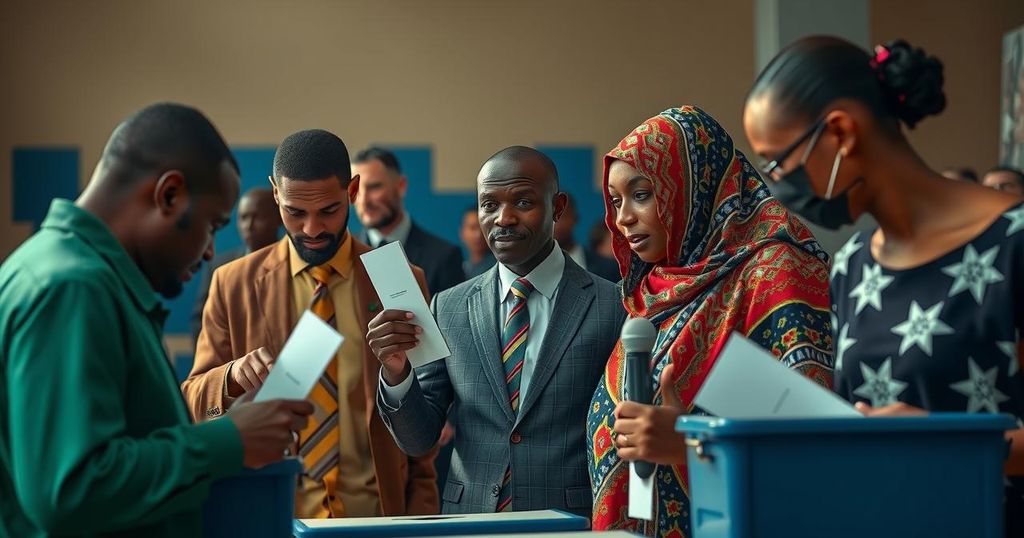Senegal held parliamentary elections on Sunday, vital for President Bassirou Diomaye Faye to implement promised reforms. With over 7 million voters and 165 seats at stake, Faye’s party, PASTEF, currently lacks a majority. Post-election, Faye aims to tackle corruption and enhance resource distribution, amidst youth discontent due to rising inflation and irregular migration concerns.
Polling stations opened in Senegal on Sunday for a crucial parliamentary election, which is poised to determine whether President Bassirou Diomaye Faye can implement his ambitious reform agenda. With over 7 million registered voters choosing 165 lawmakers in the National Assembly, President Faye’s party, PASTEF, currently lacks a majority, making this election pivotal to his administration’s success. Faye’s governance, since his election in March, has been hampered by a lack of legislative support, limiting his ability to address critical issues such as corruption, the regulation of fishing permits held by foreign companies, and equitable distribution of the nation’s natural resources. In September, President Faye dissolved the opposition-led parliament, facilitating a snap legislative election. Competing against the Takku Wallu coalition led by former President Macky Sall, Faye’s party is joined by 39 other parties vying for legislative power. Polls are scheduled to close at 6 p.m. (1800 GMT), with initial results anticipated by Monday morning, though comprehensive counting may extend beyond that timeframe. For PASTEF to secure a functional majority in the assembly, it needs to win at least 83 seats, a goal analysts believe is within reach given the party’s popularity and Faye’s electoral success in March, where he garnered 54% of the vote, becoming Africa’s youngest elected leader, shortly after being released from prison. Faye’s election reflected a considerable feeling of discontent among Senegalese youth, a demographic which comprises over 60% of the population and predominantly engages in informal employment. Rising inflation has severely impacted this group, heightening economic strain. Amidst this backdrop, Senegal has also become a significant point of departure for irregular migration to Europe, with thousands attempting to flee the harsh economic realities by risking dangerous sea voyages. The lead-up to the legislative elections has witnessed violent altercations between rival political factions, including the arson of an opposition party’s headquarters in Dakar and physical confrontations in central Senegal. Ousmane Sonko, who was instrumental in Faye’s victory, condemned the violence against PASTEF supporters, asserting their right to defend themselves, although he later urged for peaceful conduct. Recent clashes, including one in which he was attacked while campaigning, exemplify the rising political tensions. The recent presidential election in March tested Senegal’s reputation as a stable democracy amid a regional backdrop fraught with coups. Both President Faye and Ousmane Sonko had been released from incarceration mere weeks before the elections due to a political amnesty, which had followed days of unrest and concerns regarding incoming President Sall’s political ambitions and compliance with term limits.
The current parliamentary election in Senegal is critical as it will enable or hinder President Bassirou Diomaye Faye’s capacity to enact vital reforms. Elected on an anti-establishment platform, Faye’s initial months in office have been marked by an opposition-dominated parliament that obstructed his agenda focused on combating corruption and enhancing resource allocation for Senegal’s populace. Given the high levels of youth unemployment and inflation, this election resonates deeply with a frustrated electorate eager for change and reform.
In conclusion, the outcomes of Senegal’s parliamentary elections will significantly influence President Faye’s ability to implement the reforms he has championed since his election. The election reflects broader socio-political sentiments within Senegal, particularly among the youth who are seeking substantial changes to combat economic hardships. Given the surrounding tensions and past violence linked to political rivalries, the electoral process will also serve as a litmus test for Senegal’s democratic resilience, particularly within a region experiencing political instability.
Original Source: apnews.com






